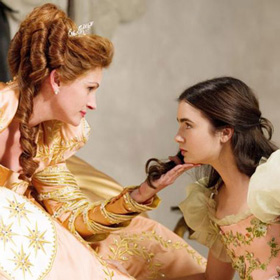Mirror Mirror

3/5
We didn't need another Snow White story, especially not this year. But director Tarsem Singh is nothing if not gratuitous, and Mirror Mirror, though tonally and generically antithetical to his earlier work (The Fall, Immortals), maintains a surfeit of visual sensation that is his trademark. Borrowing promiscuously from surrealist painting, Bollywood, Elizabethan theater and whatever else, presumably, that catches his eye, Singh this time submerges Disney-esque fairy tale into his signature brew of magic and delight, as if it needed it. All that glitters, however, is not gold, in this case — because Mirror Mirror, due to some ill-timed mediocrity, pales in comparison to Singh's better films.
Which is not to say that screenwriters Melissa Wallack and Jason Keller didn't at least try to make the tale of Snow White and the seven dwarves come alive again. In an ironic twist, America's long-deposed sweetheart Julia Roberts plays the wicked Queen. Not wickedly enough, I'm afraid. One almost wishes Nathan Lane, who plays the Queen's doting manservant and Snow White's reluctant huntsman, had switched roles with Roberts and given us his version of a vain and grumpy queen, à la The Birdcage, one with a lusty eye for bare-chested princes. Roberts is more believable anyway as someone courting affection rather than nastily clutching at it.
Speaking of bare-chested princes, the dignified and dreamy Armie Hammer (The Social Network, J. Edgar) plays the object of Snow White's affection — and the Queen's, as it turns out. Desperate for funds to support her extravagant beauty regimen of dove excrement and bee-sting collagen, the Queen discovers in Hammer's prince a wealthy and brawny solution to all her financial woes. But of course, the prince has already been bewitched by Snow's irresistible charm — a fact the Queen does not acknowledge enthusiastically.
Lilly Collins, with thick, dark eyebrows that Singh has called "polarizing," may be the perfect Snow White. A nymphet through and through, she oscillates between pure innocence and a conniving craftiness; and aided by a merry band of dwarves, she acquires mad thieving skills. It is easy, living in a post-feminist world, to admire all of Snow's unconventional traits, but one does get the sense that Singh intended them to pack more of a dramatic punch. A week after The Hunger Games broke box office records, it is neither shocking nor all that interesting to see a young female eschew rescuing and fight heroically for her own life, no matter how un-plucked she looks.
What is interesting, perhaps, in the context of The Hunger Games, is how similar a picture Mirror Mirror paints of society's ills and big government's transgressions. In both films, poverty-stricken village life remains isolated from, controlled by and dependent on (or so it is believed) a ruling capital of fantastically dressed elites. In The Hunger Games, fear of chaos and uprising is used to suppress the desires for freedom of the twelve districts; in Mirror Mirror, the Queen issues rumors of a terrible beast that will devour the villagers if she and her army do not protect them (with the aid of taxpayer money, naturally). Unfortunately, neither films aim for nuance when addressing the relationship between fear and tyranny — one fans the flames of the other, and that's that. But fear is not necessary when you have spectacle. People will remain under the spell of distraction if all appears shiny, bright and new; and they will sit dumbly salivating over a better life if it seems to be just within reach.
Hopefully, Singh's next film — not done in too much of a hurry — will drip with the radical gratuitousness of beauty while also giving our minds something a bit fleshier to chew on.
RELATED ARTICLES
Get the most-revealing celebrity conversations with the uInterview podcast!





Leave a comment